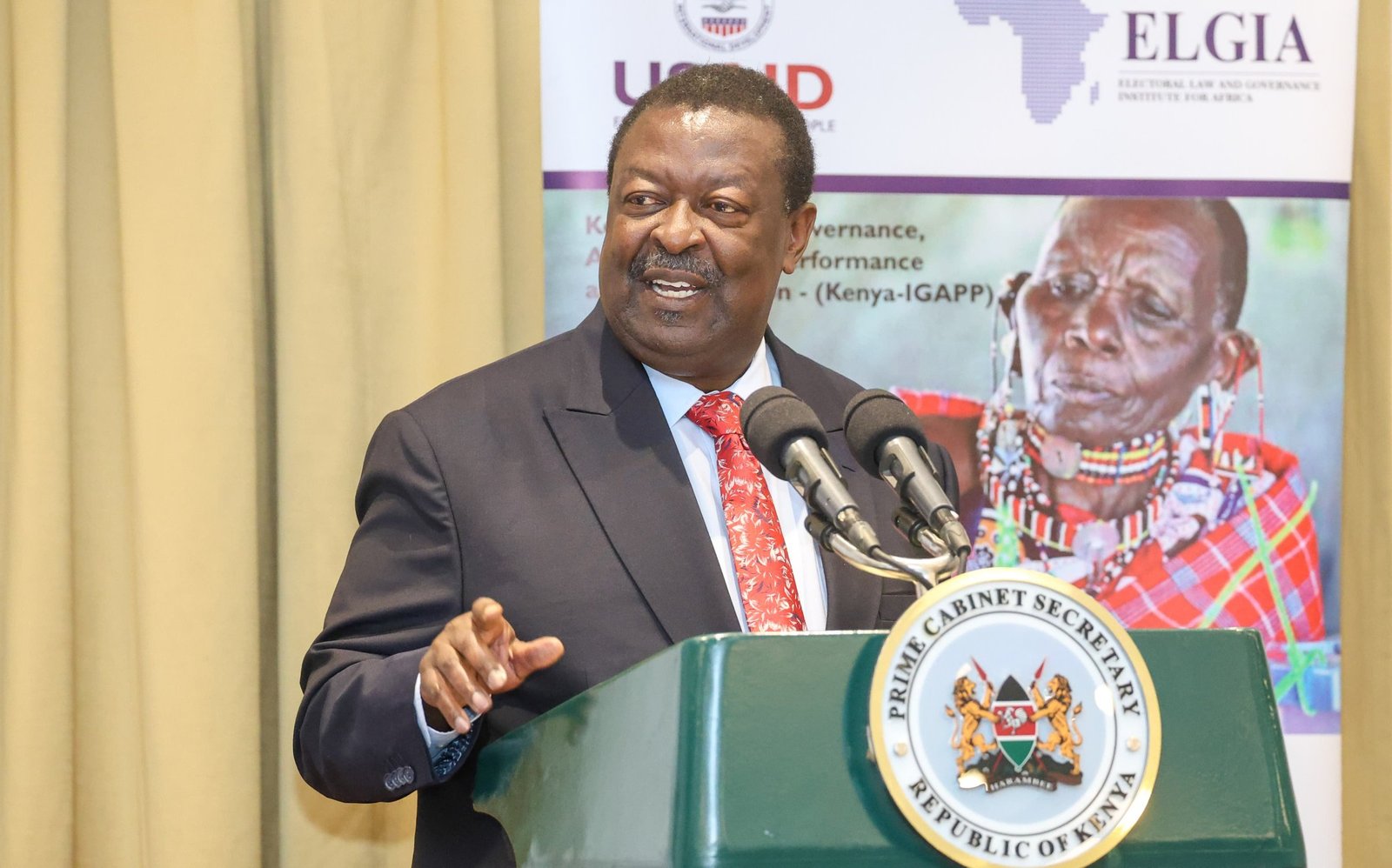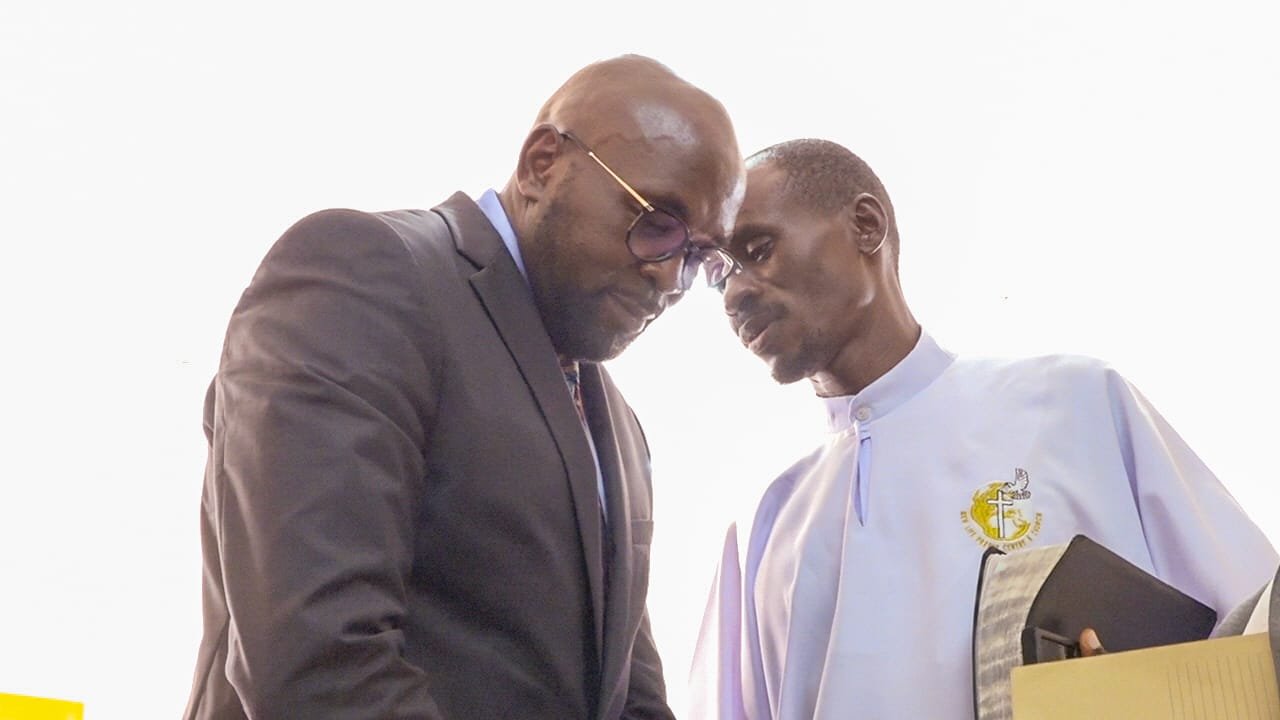Prime Cabinet Secretary, Musalia Mudavadi has said the absence of a properly constituted electoral commission poses a huge risk to the country’s democracy.
Mudavadi said on Wednesday the country requires a constitutional transformation that will promote a seamless electoral management process.
Given the dynamic nature of Kenya’s political and socio-economic landscape, he said it is necessary that discussion on electoral law reforms begins immediately and that enactment of necessary electoral laws be done at least 12 months before the 2027 General Elections.
“The immediate worry is that the Commission will lag behind in preparing for the 2027 elections. Cumulatively, delay will slow progress in the constitutionally mandatory boundaries delimitation, preparation for mass voter registration process therefore a new Voter Register considering the delimitation and general preparedness for the 2027 election,” said Mudavadi.
He made the remarks in Nakuru during the Electoral Law and Governance Institute for Africa (ELGIA) consultative workshop on post-election electoral law reform agenda.
“Conversation in this conference should complement any other processes in place, including the national dialogue by the National Dialogue Committee (NADCO), and the process for recruitment of new commissioners. You should provide concrete recommendations,” the PCS stated.
Similarly, he stated that lack of significant changes to Electoral Laws in the 2017-2022 election cycle should also be addressed, saying though recommendations were made, only late changes through the Political Parties (Amendment) Act were more political than transformative were effected to the Electoral Law.
“The last comprehensive review of our Electoral Law was in 2016 by the joint Committee led by Governor James Orengo and former Governor Kiraitu Murungi while serving in the Senate. The changes directly impacted the 2017 election and largely influenced the Supreme Court’s decision in the incidental Presidential Election Petition,” he said.
He also said discussions should be made on the differed electoral legislation.
Due to inability to enact relevant legislation in the 2017-2022 election cycle, Mudavadi said priority legislative proposals were neither considered by Parliament nor enacted.
These proposals included enactment of a separate Referendum Bill to have referendums governed differently from ordinary elections prescribed for under the Elections Act; the Amendment of the Election Campaign Financing Act to facilitate its implementation and grant the IEBC independence it requires to fulfill its mandate as prescribed in the Act and amendment to IEBC Act to facilitate Boundaries Delimitation exercise, constitutionally expected to have been completed March 2014.
He said the boundaries delimitation law lapsed with the first delimitation exercise conducted in 2012.
“We are therefore living a dangerous lapse of judgement. My Office considers these as priority legislations for reintroduction in Parliament for enactment. They are quick wins to create momentum for necessary electoral law reform,” Mudavadi said.
At the same time, the PCS said it is about time to decisively deal with the cyclic violence that afflicts the country during and after elections.
According to Mudavadi, the solution lies in Kenyans’ duty to abide by the Constitution, which provides adequate safeguards for free and fair elections.
He said elections may be a make-or-break moment, but they should never be a do-or-die moment that destroys the country.
“If full consolidation of constitutional transformation is to be realized, we must be honest there are real challenges that need addressing to make subsequent election circles trouble-free ones,” said Mudavadi.
For this to happen, he stated that the country requires good-will and commitment of all stakeholders involved in the electoral process.
He affirmed that the Government is aware of its constitutional obligation to collaborate with all stakeholders in any Constitutional journey that will benefit all Kenyans.
“In electoral contests, consolidation of constitutional transformation will require that the legal framework, institutions and administrative and operational processes stimulate the necessary efficiency and transparency to inspire public confidence,” he said.
Mudavadi explained that in the last three elections, the country has tested the legal and institutional framework, and affirmed that the agenda for constitutional transformation is on course.
The Independent and Electoral Boundaries Commission (IEBC) he said, has put its best foot forward in delivering on its mandate to Kenyans despite the perilous nature of elections in the country.
Similarly, the Judiciary has exercised its independence and Constitutional authority in elections in providing fundamental landmarks to the growth of electoral law jurisprudence, which has given valuable lessons.
On election management, he said Parliament has made significant progress establishing the legislative framework contemplated by the 2010 Constitution and establishment of relevant institutions to fulfill the constitutional objects on elections.
On implementation of the two-thirds gender principle, he explained that the Constitution provides for the enactment of Legislation towards realization of the two-thirds gender principle within five years of promulgation.
This is despite several court decisions directing Parliament to fulfill this mandate, and the Chief Justice’s advice to the former President to dissolve Parliament for failure to do so.
For 13 years, he stated that the country has struggled to understand the necessity or indeed the relevance of the two-thirds gender principle constitutional Amendments that have been proposed on this matter.
Though some of the recommendations have had reasonable formula for actualization of gender rule imperative, Mudavadi regretted that others have notoriously been at the expense of preserving the structure and composition of the Legislature as prescribed by the Constitution.
“We intend to have a crack at it again. Through progressive dialogue, we should find reasonable solutions to this Constitutional conundrum,” he said.
Report by OPCS Press Service




